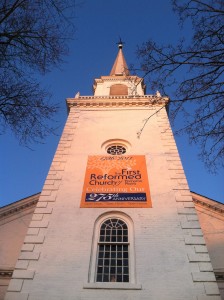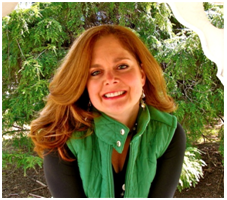Ministry Navigation in a Spirit-ed Windstorm – by Kathleen Edwards-Chase
“The wind blows where it wants to. You hear its sound, but you don’t know where it comes from or where it is going. So it is with everyone born of the Spirit” John 3:8
The church I lead just celebrated its 275th Anniversary year. It was formed in 1736, forty years before the birth of our nation. It was established to serve the Dutch farming communities in the surrounding area near the Pompton River in New Jersey, which is now a suburban Township. Located in the center of the Township is my church’s campus, which has grown to include four buildings, two manses, and a 13-acre historic cemetery. The church’s identity is grounded in being the “community’s church in the heart of the community.” In fact, when the church sanctuary caught fire and burned down 1937 as seen in this video, it was residents of the Township, not just church members, who funded its reconstruction.
Over its near three centuries of life, the church has sought to stay relevant in each era by surfing the cultural tides and by adjusting its sails every so often when the winds of the Holy Spirit shifted. Like most churches of its time, the focus was primarily about getting more people inside – its buildings, its programs, its meetings, its activities, its worship, and its membership with some outreach on the side. That way of being the church worked for nearly three centuries. And then, increasingly more and more over time, it didn’t work. Membership gradually declined, people became disillusioned, and the surrounding community, which had once helped shape the identity of the church, began to seem fairly indifferent about it. Despite its rich, long history, the church was going through something of an identity crisis. The church’s sails were flapping in the breeze.
Before attempting to turn the ship a new direction, we undertook a vision process. We studied the church, the community and the culture. We began to read scripture differently, especially the places that emphasize the fact that the God we worship is a “sending” God. God sent his Son into the world, who sent his disciples throughout the world, and who continues to send us with good news that, “The Kingdom of God is near.” (Luke 10) And, by the way, that Good News is for everyone, not just the “club members.” In our study of scripture, we began to understand Jesus differently. Jesus, who is filled with compassion, calls us to compassion. Jesus, who is also filled with passion for justice, calls us to justice, which is a social form of compassion. Or, as Brian McLaren recently told our Journey group, “Justice is the proper use of power.” We began to use our power to benefit the powerless.
In line with our vision, we began to reach out; out from the campus of buildings, out into our community, out of our community and into the world. We built Habitat for Humanity houses and served in soup kitchens. When floods ravaged our area, the church served as a bridge linking community resources with community needs. We advocated for the poor and went to court with teenagers struggling with addiction. During the past three Advents, we bought fewer gifts for Christ’s sake and purchased meals. Less than two weeks ago, we orchestrated a food-packing event of 59,000 meals. We invited groups in the Township to join us in feeding the hungry, and they did. You can read about that event in this article.
To put it in terms and in an order expressed by historian Diana Butler Bass in her book Christianity After Religion, through living our vision, we are reframing what it means to BELONG in a relational community. We are beginning to BEHAVE differently, think differently, and intentionally practice our faith differently. As a result, something transformational is occurring in our experiential BELIEF and self-identity.
Now that our eyes are opening to the radical, revolutionary, justice aspects of Jesus, we can never go back to a “business as usual” inward mentality of being the church. To use Wes Granberg-Michaelson’s terms from his book, Unexpected Destinations, we are moving from being “settled” to being “sent.” But, as any pastor who has worked toward revitalizing a historic church will tell you, that journey between the two is filled with a lot of blood, sweat, and tears. We are far from fulfilling our vision, but at least we are moving the right direction.
It wasn’t until our Journey Group met with Bass that I had a framework for what we perceived in the vision process. Bass points out that historians have mapped the Three Great Awakenings in American history where old patterns and beliefs were set aside for new forms and vitality. She is convinced that the Fourth Great Awakening is underway and as a result there is a great deal of doubt, discontent, and disillusionment in the culture and in churches. Bass concludes that the “rejection of religion is also hope for the future of faith communities.” The solution is prescribed as this: Churches must “find new paths of meaning, new ways to connect with God and neighbor, form new communities, and organize ways of making the world a better place.” It sounds like a formula for revitalization. This brings me to the heart of the justice issue.
When our group met with Brian McLaren a few weeks ago, we spent some time discussing the three biggest global systemic problems that cause the most suffering in the present and pose the greatest threat to our future. He also wrote about these threats in his book, Everything Must Change, which include:
1) The Prosperity System – The pursuit of an abundance of belongings that burns resources and produces waste at a rate our planet can’t sustain.
2) The Equity System – The growing gap between the rich and poor with the top 10% of the global population owning 85% of the world’s wealth.
3) The Security System – People who feel threatened and create and use walls and weapons to hurt each other in order to maintain security, which ironically worsens security by enraging those with no power.
Because global systemic issues are rapidly emerging, justice cannot be simply something that we do in the church along with everything else we do; it must move to the center, the heart, and be an expressive part of our identity and action. Our ecclesiastical practice must find a way to be a prophetic voice and redemptive movement, or it will become irrelevant. The Good News that “the Kingdom of God is near” gets to be Good News for everyone. It’s about moving from “settled” to “sent” for Christ’s sake. God Spirit is blowing a new direction, even filling the sails of a 275 year-old church.
Rev. Kathleen Edwards-Chase is the Lead Pastor of The First Reformed Church of Pompton Plains in New Jersey. She is also a member of the Journey Group on Social Justice through Western Theological Seminary and the Reformed Church in America.


